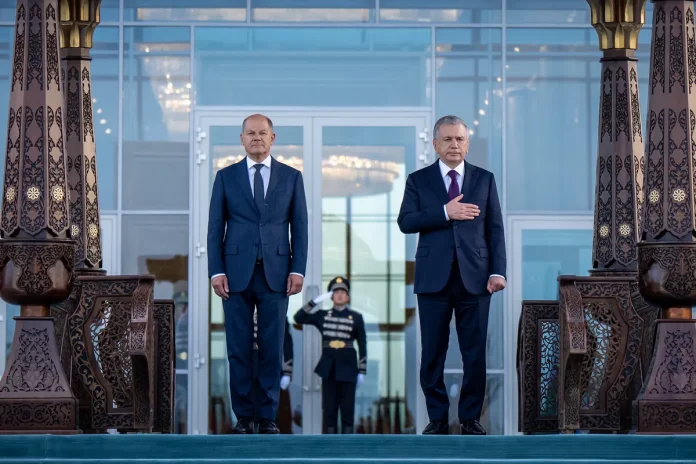German Chancellor Olaf Scholz and Interior Minister Nancy Faeser signed a migration agreement with Uzbek President Shavkat Mirziyoyev in the city of Samarkand in Uzbekistan on Sunday.
The German Interior Ministry said in a statement that the agreement signed during Chancellor Olaf Scholz’s visit to Uzbekistan is aimed at strengthening co-operation between the two countries.
It aims to create conditions for the migration of skilled labour from the Central Asian state to Germany, as well as to facilitate the return of immigrants who do not have the legal right to remain in Germany.
German Interior Minister Nancy Faeser emphasised the importance of implementing effective measures for the return of those who do not have the legal right to stay in the country, which plays a crucial role in controlling illegal migration.
Faeser noted that the agreement establishes solid rules to tackle this problem. In addition, she stressed that Germany offers opportunities in the labour market as well as in education and higher education for skilled workers from Uzbekistan, recognising the acute need for well-trained and skilled labour from abroad in many sectors.
During his visit to Uzbekistan, Scholz noted that the agreement serves as a model for similar agreements that Germany intends to conclude with other countries around the world. The agreement aims to simplify migration procedures for the labour force needed to support the growth of the German economy.
Scholz also emphasised that simplified, non-bureaucratic procedures are established for those who must return home.
Germany has signed similar agreements with Kenya, Georgia, India, Colombia, India and Morocco.
Secret talks with Uzbekistan
In June, Der Spiegel magazine wrote that the German government was secretly negotiating with Uzbekistan to be able to send home Afghans who do not qualify for refugee status without direct agreements with the Taliban.
According to the newspaper, in late May, a German delegation commissioned by Interior Minister Faeser visited Tashkent to discuss a plan with the Uzbek government. The Germans offered the Uzbek government a concrete plan. According to it, Germany could transport Afghan candidates for expulsion on charter flights to Tashkent, from where Afghan citizens would be flown to Kabul on the private airline KamAir. Such a route would ensure that Berlin would not have to negotiate directly with the Taliban government but would still be able to deport the Afghans subject to expulsion, the publication said.
The journalists pointed out that on returning from Tashkent, the German Interior Ministry delegation said the talks had been “constructive” and that the Uzbek government had promised its assistance if Berlin and Tashkent signed a formal migration agreement that would regulate the entry of skilled professionals from Uzbekistan into Germany.
